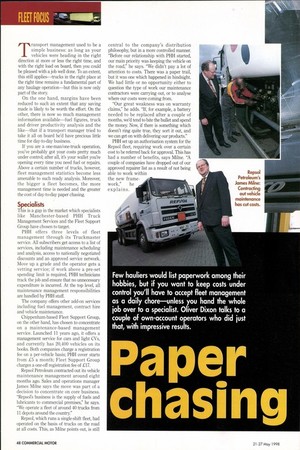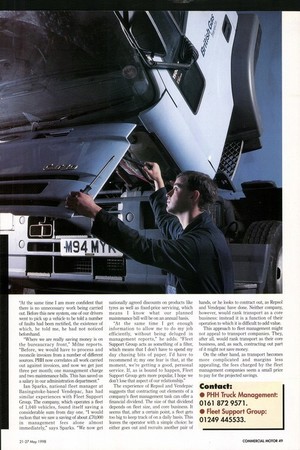Paper chasing Few hauliers would list paperwork among their hobbies,
Page 48

Page 49

If you've noticed an error in this article please click here to report it so we can fix it.
but if you want to keep costs under control you'll have to accept fleet management as a daily chore—unless you hand the whole job over to a specialist. Oliver Dixon talks to a couple of own-account operators who did just that, with impressive results. Transport management used to be a simple business: as long as your vehicles were heading in the right direction at more or less the right time, and with the right load on board, then you could be pleased with a job well done. To an extent, this still applies—trucks in the right place at the right time remains a fundamental part of any haulage operation—but this is now only part of the story On the one hand, margins have been reduced to such an extent that any saving made is likely to be worth the effort. On the other, there is now so much management information available—fuel figures, truck and driver productivity analysis and the like—that if a transport manager tried to take it all on board he'd have precious little time for day-to-day business. ‘ If you are a one-man/one-truck operation, you've probably got your costs pretty much under control; after all, it's your wallet you're opening every time you need fuel or repairs. Above a certain number of trucks, however, fleet management statistics become less amenable to such ready analysis. Moreover, the bigger a fleet becomes, the more management time is needed and the greater the cost of day-to-day paper chasing.
Specialists This is a gap in the market which specialists like Manchester-based PHH Truck Management Services and the Fleet Support Group have chosen to target.
PHH offers three levels of fleet management through its Truckmaster service. All subscribers get access to a list of services, including maintenance scheduling and analysis, access to nationally negotiated discounts and an approved service network. Move up a grade and the operator gets a vetting service; if work above a pre-set spending limit is required, PHH technicians track the job and ensure that no unnecessary expenditure is incurred. At the top level, all maintenance management responsibilities are handled by PHH staff.
The company offers other add-on services including fuel management, contract hire and vehicle maintenance.
Chippenham-based Fleet Support Group, on the other hand, has chosen to concentrate on a maintenance-based management service. Launched 11 years ago, it offers a management service for cars and light CVs, and currently has 20,400 vehicles on its books. Both companies charge a registration fee on a per-vehicle basis; PHH cover starts from £5 a month; Fleet Support Group charges a one-off registration fee of £17.
Repsol Petroleum contracted out its vehicle maintenance management around eight months ago. Sales and operations manager James Milne says the move was part of a decision to concentrate on core business. "Repsol's business is the supply of fuels and lubricants to commercial premises," he says. "We operate a fleet of around 40 trucks from 11 depots around the country" Repsol, which runs a single-shift fleet, had operated on the basis of trucks on the road at all costs. This, as Milne points out, is still central to the company's distribution philosophy, but in a more controlled manner. "Before our relationship with PM started, our main priority was keeping the vehicle on the road," he says. "We didn't pay a lot of attention to costs. There was a paper trail, but it was one which happened in hindsight. We had little or no opportunity either to question the type of work our maintenance contractors were carrying out, or to analyse where our costs were coming from.
"Our great weakness was on warranty claims," he adds. "If, for example, a battery needed to be replaced after a couple of months, we'd tend to bite the bullet and spend the money. Now, if there is something which doesn't ring quite true, they sort it out, and we can get on with delivering our products."
PHH set up an authorisation system for the Repsol fleet, requiring work over a certain cost to be referred back for approval. This has had a number of benefits, says Milne. "A couple of companies have dropped out of our approved repairer list as a result of not being able to work within the new framework," he explains.
"At the same time I am more confident that there is no unnecessary work being carried out. Before this new system, one of our drivers went to pick up a vehicle to be told a number of faults had been rectified, the existence of which, he told me, he had not noticed beforehand.
"Where we are really saving money is on the bureaucracy front," Milne reports. "Before, we would have to process and reconcile invoices from a number of different sources. PHH now correlates all work carried out against invoices, and now we get just three per month; one management charge and two maintenance bills. This has saved us a salary in our administration department."
Ian Sparks, national fleet manager at Basingstoke-based Vendepac, has had similar experiences with Fleet Support Group. The company, which operates a fleet of 1,040 vehicles, found itself saving a considerable sum from day one. "I would reckon that We saw a saving of about 00,000 in management fees alone almost immediately," says Sparks. "We now get nationally agreed discounts on products like tyres as well as fixed-price servicing, which means I know what our planned maintenance bill will be on an annual basis.
"At the same time I get enough information to allow me to do my job efficiently, without being deluged in management reports," he adds. "Fleet Support Group acts as something of a filter, which means that I don't have to spend my day chasing bits of paper. I'd have to recommend it; my one fear is that, at the moment, we're getting a good, personal service. If, as is bound to happen, Fleet Support Group gets more popular, I hope we don't lose that aspect of our relationship."
The experience of Repsol and Vendepac suggests that contracting out elements of a company's fleet management task can offer a financial dividend. The size of that dividend depends on fleet size, and core business. It seems that, after a certain point, a fleet gets too big to keep track of on a daily basis. This leaves the operator with a simple choice: he either goes out and recruits another pair of hands, or he looks to contract out, as Repsol and Vendepac have done. Neither company, however, would rank transport as a core business: instead it is a function of their operation to which it is difficult to add value.
This approach to fleet management might not appeal to transport companies. They, after all, would rank transport as their core business, and, as such, contracting out part of it might not save money.
On the other hand, as transport becomes more complicated and margins less appealing, the fees charged by the fleet management companies seem a small price to pay for the projected savings.






















































































































